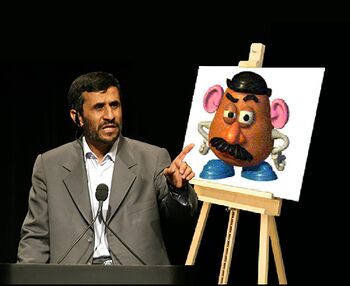Potato Famine Denial
Potato Famine denial is the act of denying the occurrence of the mass starvation in Ireland, usually referred to as the Great Potato Famine. Indeed, there is a persistent group of Potato Famine deniers who assert that the "Potato Famine" did not occur at all, or that accounts of the famine have been grossly exaggerated.
The West[edit]
British writer David Irving contends that the Potato Famine is in fact an elaborate hoax to increase Irish power in the world. In his book, The Famine Facade, Irving writes:
| “ | The Irish have their hands in every major facet of the world’s economy: beer, marshmallow filled breakfast cereal, deodorant soap, 'Kiss Me I’m Irish' T-Shirts, etc. But no one ever suspects the Irish manipulation of world affairs because of the pitiful sob-story known as ‘The Great Famine.’ Having gained the sympathy of the entire world with their harrowing tale of potato paucity, the Irish were able to gain access to the burgeoning super power that was the United States of America. | ” |
Irving even suggests that the election of John F. Kennedy was a direct consequence of the Potato Famine hoax:
| “ | Bringing the American people to tears with his description of the barren Irish landscape and the battered paupers who found their villages entirely bereft of French fries and potato chips, Kennedy was swept into office. Of course, Kennedy served the underlying Irish power structure until his reign of terror was bravely cut down by the hero who stood on the grassy knoll. Despite this significant blow to the global Irish oligarchy, the Potato Famine profiteers made another grab for power with the introduction of Lucky Charms breakfast cereal in 1963, the same year as Kennedy’s assassination. It was not until 1971, with the introduction of Count Chocula, that the cereal power struggle stabilized. | ” |
More timid famine revisionists have suggested abolishing the term “Great Famine” and replacing it with something less dramatic, such as “Good Famine” or even “Mediocre Famine.”
The Middle East[edit]
Although frowned upon in the West, Potato Famine Denial is widely held belief in many Middle Eastern nations. Iranian President Mahmoud Ahmadinejad has repeatedly questioned the existence of the Great Famine. In a controversial December 2005 speech Ahmadinejad said:
| “ | Children in America and Britain read fairy tales about ‘blight,’ ‘crop failure,’ and ‘starvation’ while Presidents and Prime Ministers dance around the Middle East like puppets…and who do you think is pulling the strings? I will not let Iran’s foreign policy be dictated by Ireland anymore! | ” |
In January of 2006, Ahmadinejad hosted the International Symposium to Evaluate the Worldwide Vision of the Great Famine. Iranian Foreign Minister, Manouchehr Mottaki, described the symposium as “the ideal scientific atmosphere for unbiased exploration of relevant issues concerning Ireland’s history.” Foreign Minister Mottaki began the symposium with a joke:
| “ | How many Irishmen does it take to screw in a light bulb? The answer is twenty one! One to screw in the light bulb and 20 to get shit-faced drunk and lie about a famine for 150 years! | ” |
Ireland[edit]
Strangely enough, there have been various Potato Famine Deniers from Ireland. Perhaps the most notable was Seamus T. Collins a WestMeath farmer, who, in 1873, was asked by a Daily Herald reporter to recount his experiences of life during the famine. Collins replied:
| “ | Der feck are ya talkin about? I don’ member any fecking famine! Git outta me fuckin way, I’m gettin a drink! | ” |
Collins' testimony was the central piece of evidence in the International Symposium to Evaluate the Worldwide Vision of the Great Famine’s historical debate. Collins' reported alcoholism and multiple cases of severe head trauma were not discussed.

